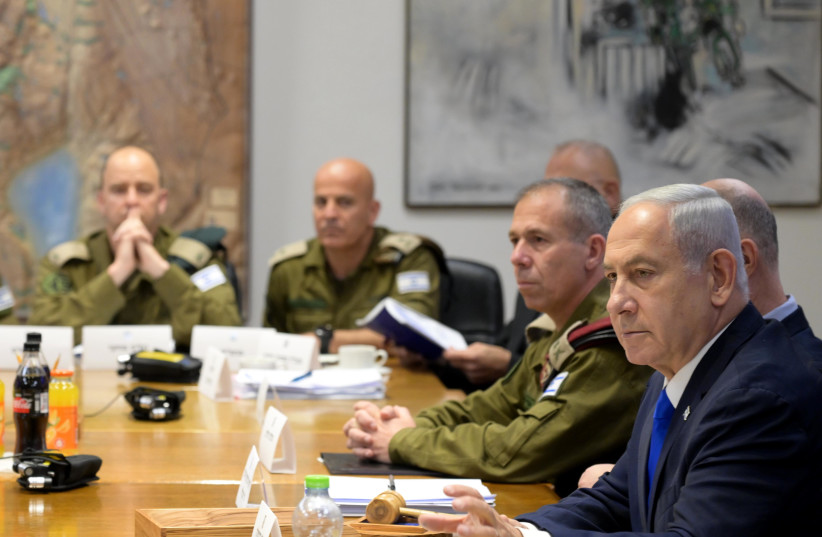In May 2021, following Operation Guardian of the Walls, Islamic Revolutionary Guards Corp (IRGC) commander Esmail Qaani declared: “In the first three days of the Palestinians’ battle against the Zionist regime, we fired many missiles into the occupied territories.” He went on to brag that the IRGC had “filled the hands” of the Palestinian terrorist groups with weapons. In essence, the Iranian commander explained that Iran and Palestinian terror groups were one and the same when it came to attacking Israel.
This conflation between Iran and Palestinian terror organizations is even more clear in Israel’s current Operation Shield and Arrow in the Gaza Strip, which began with strikes against three Palestinian Islamic Jihad (PIJ) leaders, a group characterized by its long-time leader, Ramadan Shalah, as “one fruit of the fruitful tree of Iranian Supreme Leader Khamenei.”
Israel must send a clear message to Iran
Israel must therefore leverage this operation not only to deter, degrade and demoralize the PIJ, but to send a clear message to Iran that it will not tolerate its attempts to build a ring of terror’ against Israel from Lebanon, Syria, Iraq, Yemen, the Gaza Strip, Judea and Samaria and even from within the Green Line.
As in previous rounds of fighting with Hamas, PIJ and other terror organizations, there are those calling for Israel to retake and retain full control of the Gaza Strip. Such calls, while certainly understandable in light of frustrations with the repeated rounds of fighting, would require Israel to divert a vast amount of resources and attention to the Gaza Strip.

Not only are there serious question marks about the ultimate viability of such a strategy under current conditions, but investing such resources in the Gaza Strip would divert them from the much more severe threats from Iran’s nuclear program, precision missile capabilities and range of terrorist proxies.
The goal of the current operation vis-a-vis the Gaza Strip must therefore be to restore deterrence and destroy high-value terror assets, in order to undermine the terrorist groups’ motivation and ability to attack Israel, thereby ensuring quiet for as long as possible. Following this round of fighting, Israel must implement new military and economic policies in the Gaza Strip that will contribute to further preserving calm.
These policies include actively disrupting Hamas and PIJ’s efforts to import, manufacture and test weapons, using economic levers such as work permits to create public pressure against terror attacks and undermining Hamas’s ability to fill its coffers from taxes and potentially carrying out ongoing “low-profile” operations against terrorist leaders involved in planning attacks.
JUST AS Israel has repeatedly made clear that it sees Hamas as ultimately responsible for all hostile activity emanating from the Gaza Strip, it must make clear that Iran is ultimately responsible for any hostile activities emanating from its various proxies. While this does mean that Israel should immediately attack Iran every time one of its proxies fires at Israel, it must find the time and place to extract a meaningful price from Iran for attacks carried out by those the Ayatollah regime sees as its long arm in its campaign to destroy Israel.
Surprisingly, Iran has not featured centrally in the Israeli government’s messaging regarding Operation Shield and Arrow. The Iranian connection should be front and center in the statements of the prime minister, defense minister, IDF and other relevant bodies. Indeed, while forcefully countering the PIJ will have only a limited effect on Iran, forcefully countering Iran will have a far-reaching stabilizing and positive effect on the Gaza Strip.
Of course, the latest terror attacks by Iranian proxies are only one reason why the international community must urgently change its stance and strategy on Iran. Together with Iran’s continued nuclear drive, enrichment activities and nuclear missile program, leaked American intelligence documents reveal that Iran used humanitarian aid shipments to Syria to smuggle in weapons meant for use against American forces.
Iran continues to assist Russia in its assault on Ukraine while supporting China’s efforts to expand its influence across the Middle East. The Iranian regime also continues its brutal crackdown and human rights violations at home, hanging this week two men for blasphemy due to their alleged participation in a Telegram channel named Critique of Superstition and Religion.
Israel must seek to end this Operation with the PIJ, and Hamas if it joins the fighting, licking severe wounds and with an unmistakable sense of failure in their efforts to inflict meaningful damage on Israel.
Israel must also send a clear message to Iran that it will pay a price for the actions of its proxies, whether in the Gaza Strip or anywhere else while emphasizing to the international community that a brighter future for the Gaza Strip depends on a large part on ending Iran’s malign activities. If Israel accomplishes these goals, it will have taken a significant step in countering Iran’s efforts to build a regional ring of terror.
The writer is a senior fellow at the Misgav Institute for National Security and Zionist Strategy. Follow us at @MisgavINS.
